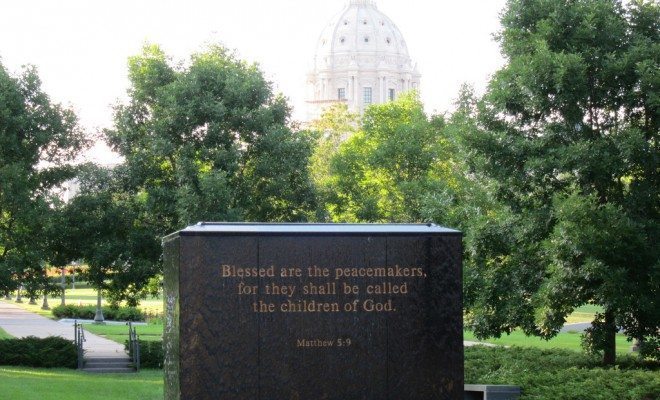 Image Courtesy of [Michael Hicks via Flickr]
Image Courtesy of [Michael Hicks via Flickr]
Politics
It’s 2016 and Some State Lawmakers are Still Trying to Fight LGBT Equality
Lawmakers in many states still seem to be having a hard time coping with the idea of not only same-sex marriage, but that same-sex couples should receive equal rights.
Kentucky, Alabama, and Georgia are not the only states to seemingly reject the principle of the SCOTUS decision last year, effectively legalizing same-sex marriage, but they are the three most recent examples. If we tried to actually discuss all of the different states’ provisions following the Supreme Court ruling, it would take hours to read this. According to the Human Rights Campaign, last year more than 100 anti-LGBT bills were filed in 29 states.
Kentucky and Georgia are two states that have recently passed religious liberty legislation through one or both of their houses. Kentucky’s bill, SB 180, passed through the senate with a 22-16 vote and is now awaiting its fate in the house. Georgia’s HB 757 passed through both the senate and the house and has been sent to the governor’s desk. The governor, Nathan Deal, has expressed that he will not sign the bill into law in its current form. Meanwhile Alabama is changing around marriage laws following the 2015 Obergefell decision.
Religious liberty laws prohibit the local or state government from infringing on businesses’ rights to deny services to people who violate their religious beliefs. Such legislation is usually written in a way that does not explicitly mention the LGBT community, but this aim is implied by the swift wave of new legislation following same-sex marriage’s effective nationwide legalization and recent cases of businesses refusing service to same-sex customers based on their religious beliefs.
Many cases about businesses and state officials refusing services to same-sex couples have been brought to court recently, including: in May 2014, a Colorado bakery that refused to make a wedding cake for a same-sex marriage citing religious beliefs, and the infamous Kim Davis of Rowan County, Kentucky, who was jailed for refusing to issue same-sex marriage licenses.
Kentucky
Kentucky’s recent legislation was created to enhance the state’s 2013 Religious Freedom Restoration Act. The new legislation clarifies that businesses cannot be punished in certain cases for violating pre-existing local ordinances that prohibit discrimination based on sexual orientation or gender identity.
The bill’s sponsor, Republican Albert Robinson of London, said the legislation is designed to protect everyone’s religious liberties…but critics worry it doesn’t extend to civil liberties.
Robinson spoke on the senate floor and said that businesses should have the freedom to refuse service if they are required to “use their skills to provide a customized service celebrating something that violated one of the tenets of their faith.”
But religious liberty legislation has a history of causing economic problems for the states that enact it. Last year following the passage of Indiana’s Religious Freedom Restoration Act, the state saw a loss of a dozen conventions resulting in a $60 million loss in revenue, according to a document prepared by Visit Indy obtained by the Associated Press.
Georgia
In Georgia, where a similar bill has passed through both houses in the state legislature, the effects of its possible passage are causing some businesses to plan on relocation.
Telecommunications firm 373K, which was founded by Kelvin Williams and is located in Atlanta, is one of the outspoken businesses against the bill. Williams, who is gay, said he and his employees supported the decision to relocate to possibly Delaware or Nevada if the bill passes.
“For the past year we’ve been building a global carrier network. We have to start hiring more,” Williams said to CBS News. “I can’t always find the perfect person in Georgia. I might have to reach out across the world. Would I want to move to Georgia if someone else offered me a job after this? The answer was no.”
Alabama
Alabama is a bit of a different situation, but still relevant for the discussion of anti-LGBT proposals. Recently, the Alabama Senate passed a bill that would do away with marriage licenses and change to contracts that are filed with the state. Alabama (like many other states) was previously having the issue of some county probate judges who had stopped giving marriage licenses altogether in order to avoid giving them to same-sex couples.
Openly gay Representative Patricia Todd, who opposed the bill, deemed it unnecessary and said that the judges should just do their jobs, according to the Associated Press.
There is no way to tell how this will affect other aspects of the law, especially when it comes to divorce. If one aspect of the marriage system is altered in the eyes of the state, other things will likely need to change as well. For example, will divorce procedure need to be changed? How is that going to work? There is really no way to tell how this is going to change the system, all to alleviate the pain and burden on a few officials who refuse to do one of their explicitly stated jobs. If any of these bills are enacted into law, it will be interesting to see the outcome and the potential economic and social consequences that could arise.








Comments